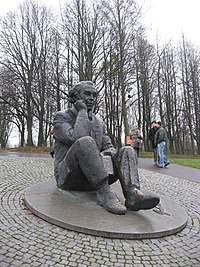Gustav Ernesaks
Gustav Ernesaks (12 December 1908 – 24 January 1993) was an Estonian composer and a choir conductor.
Gustav Ernesaks | |
|---|---|
 Monument to Gustav Ernesaks on the Tallinn Song Festival Grounds | |
| Born | 12 December 1908 |
| Died | 24 January 1993 (aged 84) Tallinn, Estonia |
| Occupation | Composer, conductor |
| Years active | 1930–1993 |
| Spouse(s) | Stella Merjam |
Ernesaks was born in Perila, Peningi Parish. He played an integral role in the Singing Revolution and was one of the father figures of the Estonian Song Festival tradition. One of his songs, a setting of Lydia Koidula's poem Mu isamaa on minu arm, became an unofficial national anthem during the years of Soviet occupation. He was also the composer of the Estonian SSR anthem used between 1945 and 1990.
Ernesaks was married in 1935 to Stella Merjam. She preceded him in death in 1973. He died in Tallinn, aged 84. They had three sons: Ott Ernesaks, Jüri Ernesaks and Peep Ernesaks. A statue of him was erected in 2004 on the Tallinn Song Festival Grounds.

Honours and awards
- Soviet Union
- Hero of Socialist Labour (1974)
- People's Artist of the USSR (1956)
- Stalin Prizes;
- 2nd class (1947)
- 3rd class (1951) – for the opera Tormide rand ("The Coast of Storms"; 1949)
- Lenin Prize (1970)
- Order of Lenin, three times (1974, 1951, 1967)
- Order of the October Revolution (1978)
- Order of the Red Banner of Labour (1946)
- Order of the Badge of Honour, twice (1965, 1988)
- Estonia
- Order of the Estonian Red Cross, 5th class (1938)
- Honoured Artist of the Estonian SSR (1942)
- People's Artist of the Estonian SSR (1947)
- State Prize of the Estonian SSR (1947, 1948, 1949, 1950, 1959, 1965)